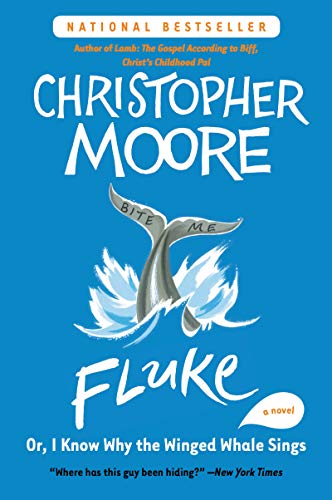 Kate Danemark wrote this review.
Kate Danemark wrote this review.
I don’t like whales. Its true. They’re like huge containers of lard, with unattractively gaping maws, lolling in the ocean and taking up an unsettling amount of space. And they’re crusty, which is just icky. Having made this incredibly un-PC statement, I have to qualify it with this: I do like the whales in Fluke. And I really like the researchers who study them. And this is Christopher Moore, after all, who can make me like just about anything, or at least keep me entertained with any of the myriad subjects he chooses to write about.
The whales in Fluke are a little unusual, and there’s something in their song, something researcher Nate Quinn is compelled to study. Could the song be mating behavior? A call to the hunt? Or do they just like the sound of their own voices?
Together with his crack team of not so scientific employees at the Maui Whale Research Foundation, Nate is on a mission to unravel this mystery. Photographer Clay Demodicus, sexpot intern Amy Earhart, and general laze about and stoner Kona assist.
Its not hard science, but its “good science,” as Clay is quick to point out to detractors. What is the point? What can knowing what the whale song means matter to anyone? For Nate, its all about that one moment when, “Something will suddenly come together, and you’ll realize that you know something that no one else in the world knows yet…for that time you are more alive than you’ll ever be.” Which sounds like a pretty fair reason to continue doing something.
Since the 1970s, this work has entirely satisfied Nate and Clay. Things start to shake up, though, when suddenly years of research is stolen, photographs go missing, and Nate spies what looks suspiciously like writing on the fluke of one of the subjects.
How could studying whale behavior be dangerous? Other than the obvious: that they are humungous, intelligent predators that basically rule the ocean. But they don’t come up on land and steal your field notes, do they? It seems unlikely, but not to “The Old Broad,” the recluse who funds the MWRF. She insists that the whales have called her on the telephone, and not only do they want to speak with Nate, they’d like a pastrami on rye as well.
Whoever it is, be it whales or competing scientists, someone is clearly trying to throw the MWRF off the trail. The team may have been pretty much just a group of somewhat shiftless and laid-back observers before, but many bizarre challenges face them in this game of human vs. whale, and it will take all of their pooled knowledge and resources to escape unscathed.
Christopher Moore‘s writing is tight, funny, and almost conversational. In every book, including this one, I’m compelled from start to finish, and though the situations in which he places his characters are often preposterous, I can’t help allowing him to pull me in. It’s not believable, but it’s so well written that I don’t care. In fact, that becomes part of the appeal. Plan to pull an all-nighter; this is a story you won’t want to miss a moment of.
In addition to the great plot, check out the Author’s Notes and the chapter on conservation that follow the novel. That’s another thing I like about Moore – he doesn’t just tell you a story, he tells you where he got it.
Even for someone as resistant to whales as I am, the information is worth serious consideration. And if you’d like to help with conservation efforts, Moore provides sources to look into.
(HarperCollins, 2003)
